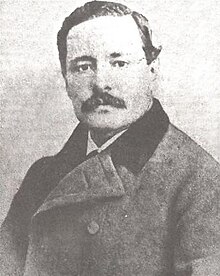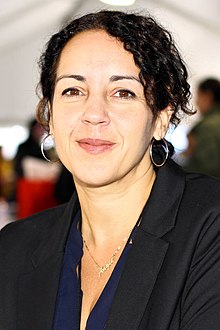Dominican Republic literature
Poetry, novels, short stories, essays and history have expressed the political, social and economic discourse of the country, which since the feat of discovery has been permeated by multiple currents of thought, especially European and American initially, and from the Far East in the productions of some writers of the late twentieth century.[3] The local passion for historical subjects, especially those dealing with the dictatorship of Rafael Trujillo and other transcendental political episodes, has influenced the development of historians of stature in different periods of the Dominican Republic.Poetry is the most cultivated genre since Manuel María Valencia, the first romantic poet, through Fabio Fiallo and others who assimilated the influences of European literary currents, to the incipient emergence of modernism embodied in three important figures: Valentín Giró, Ricardo Pérez Alfonseca and Osvaldo Bazil.After him, Dominican poetry experienced another great moment represented by Domingo Moreno Jimenes, when he founded, together with the philosopher Andrés Avelino and the poet Rafael Augusto Zorrilla, the aforementioned posthumism.From those surprises emerged another group of poets called the Generation of '48, made up of, among others, Victor Villegas, Maximo Aviles Blonda, Lupo Hernandez Rueda, Luis Alfredo Torres, Rafael Valera Benitez and Abelardo Vicioso.In the 1970s, after the fall of the Trujillo regime, writers from the Generation of the Sixties emerged with Marcio Veloz Maggiolo, Ramón Francisco, René del Risco Bermúdez, Jeannette Miller and Miguel Alfonseca.The movement led to the formation of groups such as the César Vallejo Literary Workshop: Juan Briján, José Mármol, Miguel Jiménez, Tomás Castro, Dionisio de Jesús, César Zapata, Leopoldo Minaya, Rafael García Romero, Evans Lewis, Juan Manuel Sepúlveda, Roberto Reyes, Marcial Mota, Julio Mercedes, Zaida Corniel, Irene Santos, Carmen Sánchez, Dulce Ureña, José Siris, Ylonka Perdomo, Josemon Tejada and many others.In the 1980s, the following stand out: René Rodríguez Soriano, Ángela Hernández, Rafael García Romero, Pedro Camilo, Avelino Stanley, Ramón Tejada Holguín, César Zapata, Manuel García Cartagena and in the 1990s, Martha Rivera-Garrido, who won the Casa de Teatro International Novel Prize with I've Forgotten Your Name (translated into English by Harvard University professor Mary Berg), Emilia Pereyra, Pedro Antonio Valdez, Pastor de Moya, José Carvajal, José Acosta, Luis Martín Gómez, among others.Pereyra, journalist and narrator, has written The Green Crime, Ashes of Wanting, Cocktail with Frenzy, The Cry of the Drum, in addition to the short story collection The Inapelable Design of God.Already in the 20th century we have the figure of Fabio Fiallo, who writes modernist stories influenced by his friend Rubén Darío with Cuentos fragilees (1908), as well as Tulio Manuel Cestero and Virginia Elena Ortea.[7] Among the Dominican writers who stand out in the present time are the novelists Junot Díaz, who lives in the United States, uses English as the language of literary writing and won the Putlitzer Prize with his novel The Brief Wondrous Life of Oscar Wao; Pedro Antonio Valdez (1968); Reynolds Andújar (1977), winner of the 2015 Alba Narrative Prize with his novel Useless Gestures; the poets Frank Báez (also a narrator) who is the only Dominican on the last list of 2017 in Bogotá39, José Mármol (1960),[8] Among the women stand out Ángela Hernández (1954, author of Mudanza de los Sentidos, Charamicos and other works), winner of the 2016 National Literature Prize; Rita Indiana, writer and popular singer; also worth mentioning the poetesses Minerva del Risco (daughter of the bard René del Risco); Chiqui Vicioso (National Theatre Award 1997), a feminist who although she began publishing in the early 1980s has continued to be active in this century writing essays dedicated mainly to women.It would be appropriate to mention here also the journalist Víctor Manuel Ramos, author of La vida pasajeros, a novel that won the 2010 literary contest of the North American Academy of the Spanish Language in the United States and that deals with a Dominican theme despite being written in New York .The revolutionary ideals of the independentists and the restorers, amply embellished, as well as the reasons and disbeliefs of the conservative Dominican intellectuals of the second half of the 19th century predominate in the journalistic writings of the representatives of the first wave of national essayists.Although less profound than Guridi in the analysis of political themes, but more skillful than many of his contemporaries in the perception of local customs and social ills, Ulises Francisco Espaillat motivated many of his acolytes to cultivate journalistic prose.The essays by Manuel Núñez (The Decline of the Dominican Nation, 1990), Andrés L. Mateo (Myth and Culture in the Age of Trujillo, 1993), José Rafael Lantigua (The Conspiracy of Time, 1994), and Federico Henríquez Gratereaux (A Cyclone in a Bottle, 1996) are notable examples of this trend.History, as a literary genre, has had great exponents in the country, from the founders of Dominican historiography such as José Gabriel García, Antonio del Monte y Tejada and Bernardo Pichardo, to the hegemony of the representatives of two antagonistic tendencies from the ideological point of view, such is the case of Roberto Cassá and Frank Moya Pons.Important historians from the Trujillo era, in addition to these, are Emilio Cordero Michel, Jaime de Jesus Dominguez, Franklin Franco Pichardo, Juan Daniel Balcacer and Bernardo Vega.




Leonor de OvandoManuel de Jesús GalvánJose Gabriel GarcíaManuel Rodríguez ObjíoSpanishAfricanTaínoCaribbeanavant-gardePedro Henríquez UreñaRafael TrujilloSalomé UreñaJosé Joaquín PérezManuel María ValenciaFabio FialloOtilio Vigil DíazJules VedrinesDomingo Moreno JimenesMariano Lebrón SaviñónAída Cartagena PortalatínFreddy Gatón ArceManuel del CabralPedro MirAbelardo ViciosoMarcio Veloz MaggioloJeannette MillerApril Revolution of 1965Mateo MorrisonAndrés L. MateoLeopoldo MinayaLeón Félix BatistaChiqui ViciosoCarmen Imbert BrugalMartha Rivera-GarridoPuerto RicoGermanyUnited StatesAurora AriasPedro Francisco BonóAlejandro Angulo GuridiRamón Marrero AristyFrancisco Gregorio BilliniJuan BoschHéctor García GodoyTulio Manuel CesteroHarvard UniversityMary BergMinistry of Culture of the Dominican RepublicSocrates NolascoAndrés López de MedranophilosophicalJunot DíazRita IndianaMichel de MontaigneFrancis BaconJoseph AddisonJohann GoetheThomas CarlyleThomas MacaulayHippolyte TainePaul ValéryThomas MannGyorgy LukacsÁngel GanivetMiguel de UnamunoJosé Ortega y GassetAmerico CastroJuan MontalvoJosé MartíJosé VasconcelosJosé Carlos MariáteguiOctavio PazRoberto Fernández RetamarUlises Francisco EspaillatPedro SantanaManuel Arturo Peña BatlleJuan Isidro Jimenes GrullónJoaquín BalaguerManuel NúñezMuKien Adriana SangCamila Henríquez UreñaDaisy Cocco De FilippisJosé Gabriel GarcíaRoberto CassáFrank Moya PonsFranklin Franco PichardoBernardo VegaAlfonso RodríguezAlfredo Fernández SimóAndrea Evangelina Rodríguez PerozoAngela Hernández NúñezAngie CruzArambiletArturo Féliz-CamiloBlas JiménezCarmen QuidielloCésar Nicolás PensonCristino GómezFelix María del MonteFernando CabreraFrank BáezIrvin AlbertiJael UribeJaime ColsonJuan DelancerJuan Esteban Ariza MendozaJuan Isidro MorenoJuan Pablo DuarteJulia AlvarezJulio Vega BatlleMaría Isabel SoldevilaMaria MontezMiguel D. MenaNorberto James RawlingsRámon Marrero AristyRaquel CepedaRei BerroaRené FortunatoRosa SilverioSócrates NolascoCaribbean literatureLatin American literatureMexican literatureEl PaísListín DiarioDigital Library of the Caribbean